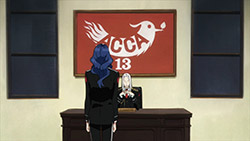 |
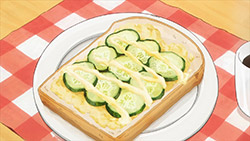 |
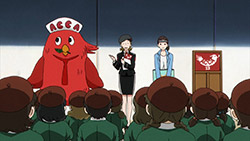 |
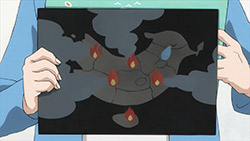 |
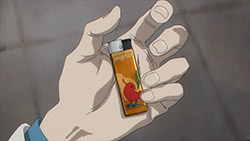 |
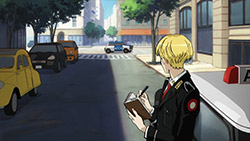 |
 |
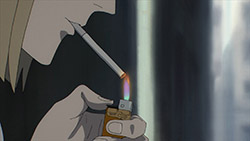 |
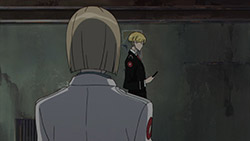 |
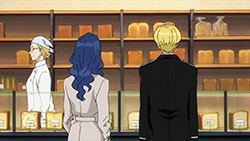 |
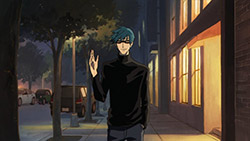 |
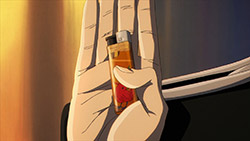 |
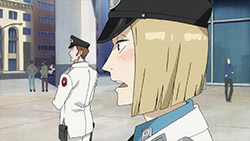 |
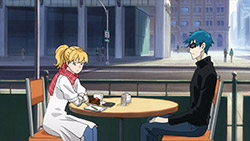 |
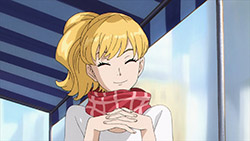 |
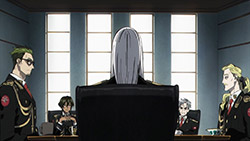 |
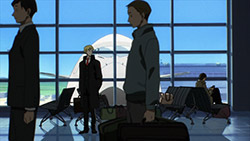 |
 |
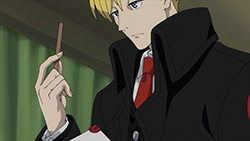 |
 |
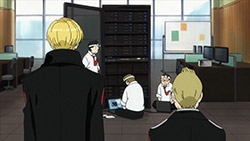 |
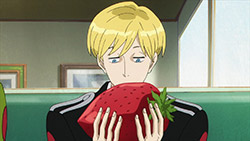 |
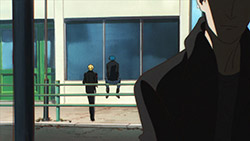 |
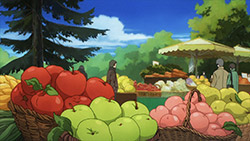 |
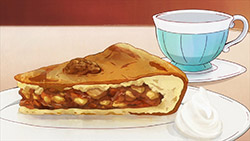 |
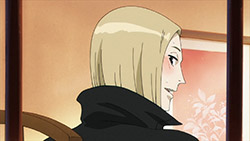 |
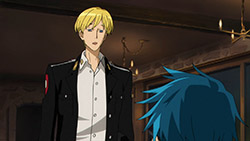 |
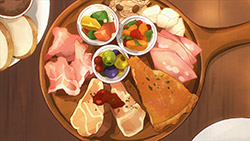 |
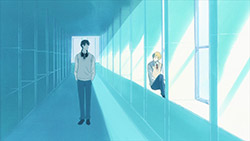 |
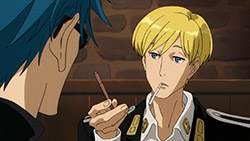 |
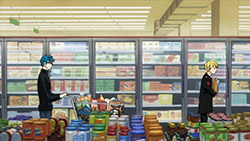 |
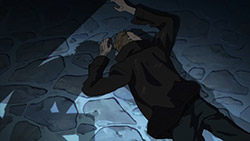 |
 |
 |
 |
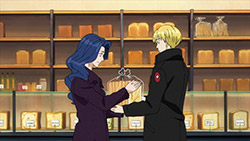 |
「悪友の名はニーノ」 (Tomo no na wa Nīno)
“The Partner in Crime’s Name Is Nino”
Seriously, all this food. ACCA: 13-ku Kansatsu-ka sports a fairly simple, almost pastel art style, but when it comes to the food it suddenly has detail to spare. Let’s not even talk about the closeups. Look at this bakery. Look at the different loaves of bread. Someone had to go out of their way to draw all that bread. Maybe even design all that bread. Is that what one would expect from the mind behind a bureaucratic intrigue like ACCA? A passion for bread? Sure, why not.
There must be some reason behind this focus on food, besides a constantly peckish mangaka. I suspect that it’s to build a contrast between the generally wholesome nutrition and all the unhealthy distrust and betrayal that goes on within the government. Food seems to be the only thing anyone gets genuine joy from in this world. Consider Jean, doesn’t ever seem to get to participate in the snack-time fun with his subordinates. Note how much of the meal he had with Nino went unfinished. Instead, he smokes. Constantly. He may seem like a chill guy, but that’s not the behaviour of a well-adjusted adult. It can’t be good for him, in more ways than one.
Food, I suppose, also serves to show of the culture of each of the districts, or at least their specialties. After Jean visited Iowa in the pilot I guess he’s going to tour the country until he hits all the other ones. Basically, more introductions, of this world, its history (via convenient exposition, again), and its governance. In particular, the whims of the 5 Chief Officers were on display once again. They can dissolve and un-dissolve the ACCA Inspection Bureau at the drop of a dime, pull officers off investigations as they please, run their own internal spy ring, and now some of them are gunning for Jean, and that can’t be good news for him. But… maybe they’re right? Who knows? Because the other important things we’re learning in this introductory phase are about character, their backgrounds, and their motivations, and there’s a lot going on with Jean that we aren’t privy to. He says that he has neither money nor connections, but that sure sounds like a lie when he’s rubbing shoulders with the top executives of the country, getting bunked in nice hotels, and, of course, still smoking like a chimney. Maybe he is staging a coup, who knows?. Good luck explaining ‘coup d’état’ to a bunch of primary-schoolers, by the way.
Certainly, everything is very grey here. I thought the cop, at least, would be the upstanding, rigid, Inspector Javert type, but it seems that he’s possessed of his own brand of loose ethics as well. Well, that’s all fine with me. The grey areas is where things get complicated and depth can be found. And the general moral greyness is very noir, and I love that. Wouldn’t want all grey, though, because then it wouldn’t be interested. Even in the most hardboiled noir, the protagonist usually knows what’s right and what’s wrong. And he generally wants to do the right thing. It’s just that he fails, and that’s conflict. Much more interesting, at least, than him simply not caring.
And that may be where all the food comes in. Their simple wholesomeness represent the ‘light’ side of the spectrum. How far does the ‘dark’ side go, then? I think we have yet to see.

Wow. Tintin really let himself go after retirement, huh?
LOL took awhile for me to get that reference and I’m 54. But that of original release. Like many things from the past Tintin keeps getting new product out there to keep new generations in play.
Giant Food makes people giants not fat, who would figure that. I love that the national bird when extinct on nation founding. That extinctions indicates to me this can go very dark. Yet our trio of nutty home office food lovers is anti dark.
Crow have you ever considered Jean has been onto you the entire time? After all Crow you do not know anything really important about how Jean does things like have his smokes and if he was into a coup would not have gotten a clue by now? Unless Crow is working with Jean that is, as Jean’s double agent in the government.
As for double agents and spies, I can totally picture Lotta being the mastermind behind the intricacies as she pulls the strings on her brother and Niino. There’s definitely something behind that smile.
Actually in this case, the relationship between the people/food are reversed. Because the people of Jumõku are famously known for their average height of 2.15 meters (7 feet), the agriculture industry in Jumõku deliberately develops large size produce/food as a marketing/advertising strategy for revitalization/economic boosting in the Jumõku district. It’s a fact mentioned in the manga, not sure if the anime will include it.
Wow good information.
In early ancient world or during the barbarian collapses Jumõku people must have ruled the battle field. Not so much vs civilizations, Roman’s bread eating legionnaires average hight 5’5 cut though the beaf eating Gauls average hight 5’10 like lawn mower vs grass. In part though that what ever survived long enough to reach the lines though a Legions massive artillery fire. (ballista, catapults, multi arrow catapults firing 20 plus arrows at once, closer automatic dart throwers think machine guns, and sometimes hired archers as well)
And further thought how do you have a coup with a seemingly unarmed government agency?
Gather sympathisers for an uprising, sprinkle some assassinations around, maybe get a general on your side, the usual things, I assume.
I’m a bit uneasy about this show. It’s sort of hard for me to fully understand the plot of this series but then there’s something about it that makes me keep watching it..
It’s all very understated, I think it is. There’s nothing very explicit about anything and, as others note below, probably nothing is what it seems.
All of this pathetic corrupt technocracy being especially well fed. wonder what the average man eats.
I don’t blame that cop. I’d fall for Jean’s sister too. She’s such a cutie.
Watching the opening again after this episode gives the images a complete new meaning. As the lyrics say “Nothing is what it seems.”.
“Nothing is what it seems”, yep, definitely the best thing I can write about this show up to now. What I enjoy the most is the fact that we can’t really say if Jean is really planning a coup or not – we didn’t get to know him very well after these two episodes despite being our MC, almost everything about him is still a mystery. The whole show is really intriguing, art is lovely, soundtrack reminds me of some kind of mix between K project and Kekkai Sensen. Enjoying it a lot.
I feel there is a similarity too one piece in character design. The tall lanky figures.
I’m enjoying the series. Reminds me of a J drama Cop show.
Enjoying the series so far. I avoided it because of the poster. This must be the sleeper of the season. I saw your review. So had a llok
Thanks
Always glad to hear that someone read our previews and gave a show a shot. That’s what the preview is there for.
Yeah you’re right Passerby he does smoke like a chimney haha
Somewhere this episode reminds me of Airantou (lol), and I can’t believe I’m still enjoying this (mostly shit animation of a) show. I’m also okay with shows which like to lay a big mystery only to be revealed at the end. I’ve seen quite a few. I just hope it will not be disappointing. Also, it’s convenient to just take a kids lesson in history. I just felt like I’ve been brainwashed haha
In a general sense, agree with what lunascha posted above (and in some sense RedRocket as well regarding the coup d’état). I’m not really confused as to the plot per se (i.e. threat of some coup d’etat which Jean may or may not part of, etc.), but rather trying to get a handle on world setting/structure.
So if I have this right, 13 independent nations were unified into one country. Something happened, coup d’état against central gov’t/king about 100 years ago which resulted in the now “districts” (which I assume match up with the former nations geographically) granted autonomy (so independent/retained sovereignty?) with a central congress set up. Not sure, but this strikes me as some sort of confederacy with the King (or queen) as a figurehead. Right? Granted “central congress”, but then how does that reconcile with “autonomous” districts? Was it just that they didn’t want a monarchy? Can the districts leave the whatever political structure is at any time, or is the structure more binding and they are not truly autonomous? How would a breach of said agreement/political structure be enforced? Is there a central military?
Also, ACCA was formed to handle some public services such as police, fire & medical which to me is seems to be privatizing public services (ACCA is a “civilian” organization). HQ oversees the 13 district branches and Jean’s Inspection division is like a corporation’s internal audit/compliance division. Lastly, the 5 “chief directors” act as a board of directors and the “director-general” is the CEO. Perhaps set up by a political agreement, but to me ACCA does seem like a civilian run corporation. Not sure if that’s correct. Still, can an “autonomous” district just decide, we got this and boot ACCA? Again, what’s the political structure here? How binding is the agreement from a 100 years ago for these “autonomous” districts concerning ACCA?
Maybe the source LN does a better job of explaining the setup (suspect it does), but it’s somewhat confusing and nebulous so far with the anime. It’s an issue because I’m trying to figure exactly what are the stakes with this threat of “coup d’état”. Coup from ACCA or the “confederacy” (or whatever the general political structure is)?
So Jean isn’t rich? Jean’s “family business” as “landlord” (per anime) is managing a very high end (I think the most expensive) condo/appt. building in the city so do they own the building? “Family business” and “landlord” to me indicates ownership = rich unless riddled with debt maybe? Dude doesn’t seem to lack for money (or business connections) even if he gets his cigarettes for free (somehow). Not a big deal, just trying to figure it out.
I do wonder whether Jean is a bit too smart/omniscient. Seemed to know a lot about Rail which I couldn’t tell whether was simply doing some digging into Rail’s company files, or if that stuff was all off the books (my guess). If so, maybe Nino told him? Still, Jean sure found Rail awfully fast in that alley.
Can’t say I’m a Rail fan. “I was undermined by rich people/those with rank & power”. Uh, what about the “pocketed and fenced confiscated goods four times” and “dealings with criminals” as a police officer? That might have had something to do with it, Rail. Perhaps his misdeeds were not discovered (and Jean just somehow knows), but not like you’re clean dude. Also, he’s quite the stalker. First Jean now Jean’s sister, or did he just coincidentally show up at the cafe when she was with Owl? My impression was that it was not a coincidence.
So some questions/potential issues for me, but I do agree that there’s something here which still nets out as interesting (or at least interesting enough) to keep watching.
I think it’s a feudal structure. The king is the king, but each, let’s say, dukedom gets to run themselves. There is a central government of sorts, but it seems to be a purely executive branch overseeing a complex bureaucracy.
Hmm… feudal structure huh. Have to say that this didn’t strike me as such, at least in a more classic sense of the term (i.e. all three estates of the realm: the nobility, the clergy, and those living by their labour, most directly the peasantry bound by manorialism). So not truly autonomous as I thought. Also guessing no central/national military then. Should I assume the 5 “chief directors” are nobility? Kind of curious how they got the position. If that’s a spoiler, then just skip the question.
Establishing “central congress” makes me think of 18th century Parliament of England post Magna Carta type of situation. Maybe that’s still off. IDK. There was a revolt and some sort of compromise in the story so it’s a bit hard to envision the monarchy wasn’t watered down as a result.
At any rate, thanks. Helps because I have a more concrete sense that the 13 districts are still united (to some degree) as a single country which in turn gives me a better sense of the stakes at risk. As you and others have noted, the show (series I suspect) plays its cards close to its chest so I imagine the particulars of who, what & why in terms of the (potential) coup d’etat will be slowly parceled out as the season progresses.
From my business school days. There is not much difference in organization between a large government agency and a large corporation. Primary differences is ability to let workers go and ability to make major changes from the outside, with government agencies often law and political pressure make restructuring difficult. Both have the whole set of bureaucracy organization problems especially empire building (some MMO’s I play are suffering bad from empire building problems as long as you have a basic operation department it will make changes to how the game works needed or not) In fact large corporations by size have lost most of the advantages that smaller businesses have over government although you can find the same type of problems even in the smallest businesses as turn over show demonstrate.
Here the ACCA actually seams like a mostly independent government agency with no profit motive. I would imagine waste is a major system problem. Some office employees seams to have little to do other than think of what next to eat. This is restricted though as it seams each area does have a lot of control of ACCA parts in their area. I got no problem with the agency heads having ability to restructure some things a will. In government agencies many have a lot of restructuring power except in what buildings are used and how many staff must be in those buildings depending on congressional district those buildings are in. In this story the confederation nature has given the central bureaucracy a lot of autonomy. There have been major complaints in the European Union about the autonomy of the central bureaucracy as the European Union functions in fact like a Confederation. The separatists movement often use the lack of any serious oversight of the central bureaucracy in the system as a reason to leave.
@RedRocket: Well the overall organizational structure may be similar, but there are definitely differences between gov’t & private businesses. For one thing, non profit or not, gov’t businesses are sometimes viewed as overly static and inefficient (as you note). As for large vs. small corps, they each have their own advantages/disadvantages.
I did get into the weeds a bit about on ACCA organizational structure, but really my primary goal/question was to get a better understanding of the overall political structure of this world (incl. bit more on how ACCA fits in with that). Seems my initial conclusions (confederacy) were off, but I do have a better idea now which helps.
The main difference between a large government agency and a large corporation is that the corporation is exposed to competition while the agency is not. So you have a constant driver of change which the agency lacks.
Interesting post about the food and it’s possible meaning in this series.
Did no one wonder what did Crow mean in the end when he said he has been observing Jean for 30 years? Since his birth then? It doesn’t make much sens unless some deeper reason is revealed later I guess…?
And about the hotel room: Jean seemed genuinely surprised, he even called the hotel reception to tell them about it, and the fact he thanked the branch director for his hospitality, gives off the impression he simply assumed he was treated well, and was thankful for it.
Thank you! But it was mostly that I was hungry when I wrote this.